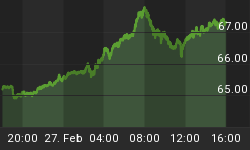I have warned investors in the past that the Fed's rapid expansion of credit would cause the U.S. economy to enter a period of unprecedented volatility between inflation and deflation. This would lead to violent moves in most markets, especially interest rate sensitive investments. That time has now arrived.
The easy monetary policy from most central banks has led to low interest rate addictions and global imbalances on a massive scale. Therefore, any threatened removal of central banks' liquidity would cause the pendulum to swing intensely from inflation to deflation. Recent communications from the People's Bank of China and Fed (although a parade of FOMC members has been trying to recant Bernanke's comments) have tried to wean the market's dependency on free money.
The problem is markets have become so addicted to low interest rates and liquidity injections that even a hint at preparing markets for the eventual increase of rates caused massive repercussions. Perhaps that is the message plunging commodity prices have been telling us.
In China, the threat of withdrawing stimulus caused their interbank lending rate (SHIPOR) to spike from 3%, to over 10% within a week. This tells us Chinese real estate assets are in such distress that banks do not trust each other's collateral when making overnight loans. Sort of reminds you of our LIBOR market debacle the U.S. suffered through back in 2008 before the S&P 500 plunged 60%. The manipulation of money supply and investments by the Chinese government caused runaway inflation in their housing sector. Now, the attempt at normalization in the real estate market by the new Xi Jinping regime has revealed its insolvent condition and helped send the Shanghai Stock Market down 15% in the last month.
Some countries have just begun the pursuit of record-breaking inflation. In Japan, the Abe regime is not pursing policies that promote viable economic growth; but has instead based a recovery on currency destruction and inflation. Europe has already aggressively tried the growth model that is based on deficit spending and inflation. And by all accounts their problems continue to mount, with Ireland falling back into a recession; just as Italy's recession protracts and deepens. Emerging markets continue to suffer slow growth. The Emerging Market Index, which is down 16% YTD alone, shows the condition is only getting worse. These countries depend on supplying materials to the developed world for growth. However, as these established economies suffer through the devastating effects from massive inflation and deflation, demand for imports suffers greatly.
But the Fed seems convinced that the U.S. economy is strong enough to withstand the negative effects from a global economic malaise. Despite the chaos that is brewing all over the globe, Ben Bernanke still provided the markets with a timeline for ending his QE program and predicted the economy will magically recover in 2014. If that is indeed the case, it will be the first accurate forecast made since the Federal Reserve was created in 1913.
Why should the U.S. economy strengthen next year? It wouldn't come from strong exports to a vibrant global economy. There hasn't been any reduction in taxes or regulations and the dollar has become very unstable. And, most importantly, it appears the thirty-year bull market in Treasuries has ended quite abruptly. The yield on the Ten-Year Note soared from 1.6%, to 2.67% in a matter of days. The Fed seems oblivious to the fact that markets have become completely reliant on perpetual inflation; and merely indicating the intention of stopping to manipulate interest rates causes a violent move upward.
Despite all this, I believe the Fed has realized QE can't go on forever and is desperate to start winding it down. However, I am even more convinced the U.S. economy will dramatically slow this summer (from an already anemic 1.8% growth rate) and cause a reluctant Ben Bernanke to hold any tapering of asset purchase in abeyance. In fact, he may even increase the current monthly $85 billion allotment.
This means, unfortunately, investors and consumers will suffer yet more violent moves between inflation and deflation in the future. Gold miners are now in the process of putting in a bottom and telegraphing the fact that in the near future central bankers will acknowledge their addictions to low interest rates and credit creation; and probably print even more.















